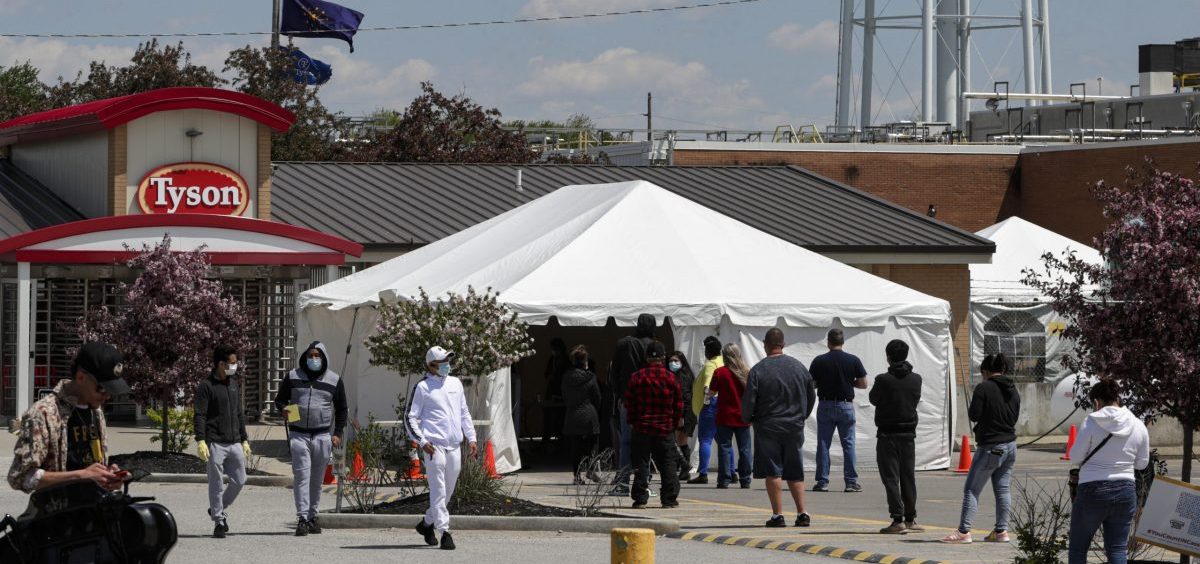News

Thousands Of Workers Say Their Jobs Are Unsafe As Economy Reopens
By: Chris Arnold | NPR
Posted on:
CAMILLA, Ga. (NPR) — The past few months have weighed heavily on Edgar Fields. He’s been meeting with workers at chicken processing plants around Georgia and nearby states. His union represents them, and many have become sick. Some have died.
“You know, you lay in the bed and you can’t sleep because stuff is on your mind? I’ve got to do this. I’ve got to do that,” he says. “That’s what I wake up in every morning thinking, what can I do to protect my members to where they have a safe work environment to go to?”
For example, Fields says, take a Tyson Foods chicken processing facility in Camilla, Ga. Tyson confirms more than 100 workers there tested positive for the coronavirus and four died. Fields says the company promised to spread the workers out 6 feet apart.
But it’s not doing that everywhere in the plant. “In some places they haven’t spread them out at all,” Fields says. “They’re still close.” He says the company could do it if it processed fewer chickens. He’s also pushing for on-site testing for the coronavirus at the plant.
Tyson tells NPR in a statement, “Our top priority is the health and safety of our team members.” The company says it’s checking workers’ temperatures and requiring them to wear masks. And that they wear face shields in “the limited areas in the plant where neither barriers nor physical separation is feasible.”
The company also says its safety measures “meet or exceed” federal safety guidelines from the Centers for Disease Control and Prevention and the Occupational Safety and Health Administration.
But therein lies the heart of a big problem, according to safety advocates. The federal government has issued guidelines for employers during the outbreak — but those aren’t mandatory or enforceable.
“They have decided not to issue any specific requirements for employers to keep workers 6 feet apart, to keep workers in masks,” says Debbie Berkowitz, a former chief of staff at OSHA. “The guidance is voluntary. Employers can comply with it, or they can ignore it.”
As a result, she says, “OSHA has received thousands of complaints from terrified workers from all over the economy.” Berkowitz is now working with the nonprofit National Employment Law Project.
She says there are still some things workers can do. If an employer isn’t following even the suggested federal guidelines from OSHA and the CDC, workers should still file a complaint with OSHA. She says you can do that confidentially at osha.gov.
Berkowitz says OSHA will contact the employer, and that in itself can be a strong nudge to improve safety measures. “Sometimes that can make all the difference in the world,” she says.
Workers may also have state-level protections.
“There are states where the governors have, by executive order to protect the public, have set some real requirements in the workplace,” Berkowitz says. “Workers really need governors and health departments to step in because the federal government has failed here.”
Loren Sweatt, the top Trump administration official overseeing OSHA, says the agency is not failing workers. “We have over 5,000 complaints, and our inspectors are investigating all of them,” Sweatt said at a recent hearing in Congress. “So yes, the agency has been doing its job since the beginning of this pandemic.”
But Berkowitz says almost none of those investigations have been on-site, in-person inspections which could result in enforcement actions. And she says with only voluntary federal guidelines there’s not much OSHA can do in the way of enforcement anyway.
The AFL-CIO disagrees. The big labor union group is suing OSHA to get it to issue emergency national mandatory safety requirements for the outbreak.
Meanwhile, the economy continues to reopen. And while meat processing plants have seen some of the worst COVID-19 outbreaks, people with plenty of other types of jobs are worried about their safety, too.
“I’m feeling anxious. It’s stressful because I feel like my back is up against a wall,” says Ashley Weiner, a hairstylist who has two young children in Portland, Ore.
Hair salons are about to reopen there, and she’ll need to make money. So she’ll be touching clients’ heads and breathing next to them indoors all day. She says she worries that customers and salons won’t be able to get high-quality face masks.
“I know people who work in the medical field here, and they say they don’t have enough supplies themselves, so then how are we going to be getting access to these supplies?” Weiner asks.
Berkowitz says you can call your state health department, governor’s office and attorney general’s office to find out what the state-level protections are in your area.
Another issue advocates for workers are watching: Republican lawmakers in Washington want to shield employers from legal liability if their workers contract the coronavirus. The lawmakers argue that employers need that protection to reopen, but critics say it would result in more unsafe workplaces.
9(MDI4ODU1ODA1MDE0ODA3MTMyMDY2MTJiNQ000))

